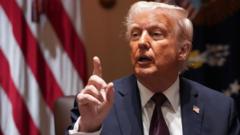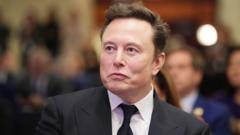In a significant first conversation since Carney took office, both leaders characterized the dialogue as constructive while addressing the looming threat of tariffs that could impact the Canadian auto industry significantly.
Trump's Diplomatic Approach: A Call That Respected Canada's Sovereignty

Trump's Diplomatic Approach: A Call That Respected Canada's Sovereignty
US President Donald Trump's recent call with Canadian Prime Minister Mark Carney has sparked discussions regarding a shift in diplomatic tone amid ongoing trade tensions.
Despite a backdrop of contentious relations between the countries, Prime Minister Mark Carney, currently campaigning for re-election, articulated that Trump "respected Canada's sovereignty" during their call. This marks a notable shift from Trump’s past remarks, where he frequently suggested that Canada should become the 51st state, an assertion that elicited a strong backlash among Canadians.
In this context, the timing of the call is crucial; it comes as the US sets to implement a controversial 25% tariff on Canadian vehicle imports on April 2, a move that could threaten around 500,000 jobs in Canada’s auto sector. Carney has responded with strong rhetoric, previously stating that the US is "no longer a reliable trading partner" and indicating that the longstanding relationship between the two nations has changed.
While both leaders expressed optimism for future discussions post-election, with Trump mentioning a relationship based on "mutually beneficial" terms, Canadians remain wary. On the campaign trail, various political figures have voiced mixed reactions to the call. Conservative leader Pierre Poilievre has criticized the current Liberal government for perceived failures in handling trade relations, blaming them for Trump’s tariffs. In contrast, Bloc Québécois leader Yves-François Blanchet raised concerns that Carney might be too open to concessions under US pressure.
Looking forward, the landscape for Canada’s economic policy under Carney remains uncertain, especially concerning Trump’s announcement of additional tariffs targeted at countries that engage with the European Union to oppose US trade measures.
As Canada heads toward the April 28 election, the dynamics between the neighboring countries will continue to evolve, influencing not only the current administration's stance but also the future political landscape in Canada.
In this context, the timing of the call is crucial; it comes as the US sets to implement a controversial 25% tariff on Canadian vehicle imports on April 2, a move that could threaten around 500,000 jobs in Canada’s auto sector. Carney has responded with strong rhetoric, previously stating that the US is "no longer a reliable trading partner" and indicating that the longstanding relationship between the two nations has changed.
While both leaders expressed optimism for future discussions post-election, with Trump mentioning a relationship based on "mutually beneficial" terms, Canadians remain wary. On the campaign trail, various political figures have voiced mixed reactions to the call. Conservative leader Pierre Poilievre has criticized the current Liberal government for perceived failures in handling trade relations, blaming them for Trump’s tariffs. In contrast, Bloc Québécois leader Yves-François Blanchet raised concerns that Carney might be too open to concessions under US pressure.
Looking forward, the landscape for Canada’s economic policy under Carney remains uncertain, especially concerning Trump’s announcement of additional tariffs targeted at countries that engage with the European Union to oppose US trade measures.
As Canada heads toward the April 28 election, the dynamics between the neighboring countries will continue to evolve, influencing not only the current administration's stance but also the future political landscape in Canada.























